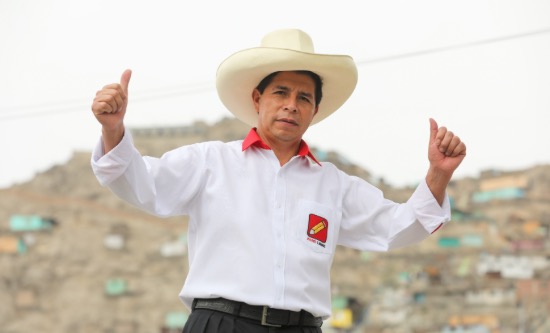
On 19 July, Peru’s National Electoral Jury declared the progressive and indigenous Pedro Castillo Terrones, of the Peru Libre party, winner of the 6 June presidential runoff. On a 74.57% turnout the conservative Keiko Fujimori of Fuerza Popular took 8,791,521 votes (49.87%) and Castillo 8,835,579 (50.12%). Fujimori desperately tried to show fraud at different polling stations. Had she become president, charges pending against her for corruption would have been suspended and she might free her imprisoned ex-president father. Fujimori would have attacked the workers and poor in the interests of her US backers. Alvaro Michaels reports.
Castillo became the country’s new head of state. Dina Boluarte is the first elected woman vice president. Castillo’s victory is a blow to the 30-year neoliberal model which has plunged Peru into crisis. However, Castillo’s egalitarian aims, including constitutional changes and effective taxation on the mining industry, face barriers resulting from the 11 April Congressional elections. The 130 Congress members are fragmented across ten parties. No party has a majority, so ad hoc alliances will be key to any change. Fujimori’s speech reluctantly accepted the Electoral Jury’s decision but called for obstruction to Castillo’s programme with ‘non-violent protests’, saying his government would be ‘illegitimate’, and calling for unity ‘in the task of stopping communism and defending press freedom’.
However, Peru’s State Attorney announced that Fujimori would be investigated for allegedly ‘disturbing the electoral process’ through filing 760 requests for annulment of different polling stations. Fujimori and her party face other cases for corruption and irregular financing of her campaign. Fujimori’s involvement in conspiracy to bribe judges is currently being investigated, involving Vladimiro Montesinos, former head of intelligence during Alberto Fujimori’s dictatorship (1990-2000). Fujimori has twice previously been in preventative custody for corruption.
The 63 former high-ranking officers from the Armed Forces who wrote echoing Fujimori’s accusations of electoral fraud and calling for a coup to avoid Castillo’s inauguration are now under investigation for alleged rebellion, sedition, and conspiracy. Former dictator Francisco Morales (1975-1980), ex-Prime Minister Walter Martos, and Congressmen Jorge Montoya and Jose Cuento are among the defendants.
Parliamentary paralysis
Castillo’s Congressional alliance will have 55 seats, the right-wing opposition 59 seats. The conservative Acción Popular holds the balance of votes and a member was elected Congressional president, backed by Fujimori’s party.
The three weeks of delay between the election and the confirmation of its results allowed pressure to be applied on Castillo to prevent the introduction of radical policy changes. Consequently, the OAS, the EU and Washington were happy to approve the election process. Political stability is necessary to continue extracting mining wealth from the country. With a hung Congress, Castillo is in no immediate position to raise taxes on foreign investments. Anglo American, with another investor, has spent over $5bn getting Quellaveco, a vast open-pit copper mine, running. It is expected to open in 2022.
Covid-19
As of 30 July, Peru has recorded 196,291 Covid-19 deaths, that is 5,865 deaths per million population, proportionately the worst official toll in the world. The pandemic state of emergency order is extended throughout August. Since March 2020, a night curfew has been in force in Peru as a preventive measure to contain infections. Health services for the masses remain hopelessly inadequate.
On 6 July, the Lima Chamber of Commerce showed that due to the coronavirus health crisis some 6.3 million Peruvians fell out of the country’s middle-class during 2020, a shrinkage from 43.6% in 2019 (14 million) to 24% (7.9 million). This is after a rise from 17% in 2004, resulting from a 122.4% growth in the gross national product. As in all ‘developing’ countries, this class is highly vulnerable without access to social protection or finance. In Peru, 60% of the economically active have informal jobs, with half these classified as self-employed. The number of people below the poverty line grew to 30.1% of the population during 2020.
Assuming political stability and an improved global market, national output may recover some 10% this year. The limited vaccine deliveries under the UN Covax scheme, starting with just 117,000 doses in March, and plans for only 20% of the total population to receive a single dose this year, will see continued misery for the poor. Castillo is in a difficult position and his political relation to the masses will be critical in providing him with a basis to make any effective change for them.
Fight Racism! Fight Imperialism! No 283, August/September 2021




